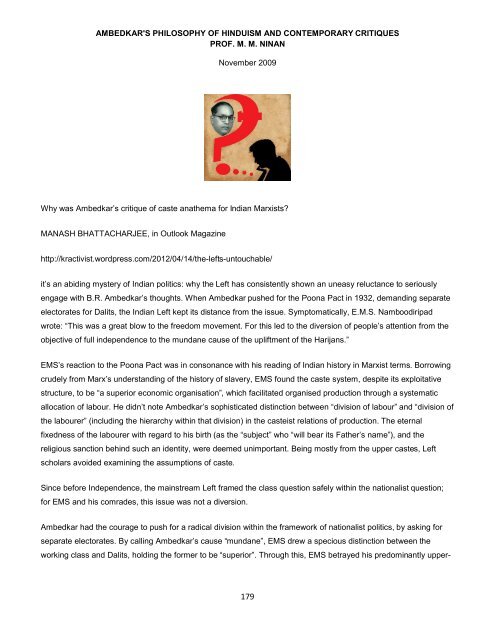Ambedkar-Philosophy of Hinduism
Create successful ePaper yourself
Turn your PDF publications into a flip-book with our unique Google optimized e-Paper software.
AMBEDKAR'S PHILOSOPHY OF HINDUISM AND CONTEMPORARY CRITIQUES<br />
PROF. M. M. NINAN<br />
November 2009<br />
Why was <strong>Ambedkar</strong>’s critique <strong>of</strong> caste anathema for Indian Marxists?<br />
MANASH BHATTACHARJEE, in Outlook Magazine<br />
http://kractivist.wordpress.com/2012/04/14/the-lefts-untouchable/<br />
it’s an abiding mystery <strong>of</strong> Indian politics: why the Left has consistently shown an uneasy reluctance to seriously<br />
engage with B.R. <strong>Ambedkar</strong>’s thoughts. When <strong>Ambedkar</strong> pushed for the Poona Pact in 1932, demanding separate<br />
electorates for Dalits, the Indian Left kept its distance from the issue. Symptomatically, E.M.S. Namboodiripad<br />
wrote: “This was a great blow to the freedom movement. For this led to the diversion <strong>of</strong> people’s attention from the<br />
objective <strong>of</strong> full independence to the mundane cause <strong>of</strong> the upliftment <strong>of</strong> the Harijans.”<br />
EMS’s reaction to the Poona Pact was in consonance with his reading <strong>of</strong> Indian history in Marxist terms. Borrowing<br />
crudely from Marx’s understanding <strong>of</strong> the history <strong>of</strong> slavery, EMS found the caste system, despite its exploitative<br />
structure, to be “a superior economic organisation”, which facilitated organised production through a systematic<br />
allocation <strong>of</strong> labour. He didn’t note <strong>Ambedkar</strong>’s sophisticated distinction between “division <strong>of</strong> labour” and “division <strong>of</strong><br />
the labourer” (including the hierarchy within that division) in the casteist relations <strong>of</strong> production. The eternal<br />
fixedness <strong>of</strong> the labourer with regard to his birth (as the “subject” who “will bear its Father’s name”), and the<br />
religious sanction behind such an identity, were deemed unimportant. Being mostly from the upper castes, Left<br />
scholars avoided examining the assumptions <strong>of</strong> caste.<br />
Since before Independence, the mainstream Left framed the class question safely within the nationalist question;<br />
for EMS and his comrades, this issue was not a diversion.<br />
<strong>Ambedkar</strong> had the courage to push for a radical division within the framework <strong>of</strong> nationalist politics, by asking for<br />
separate electorates. By calling <strong>Ambedkar</strong>’s cause “mundane”, EMS drew a specious distinction between the<br />
working class and Dalits, holding the former to be “superior”. Through this, EMS betrayed his predominantly upper-<br />
179


















